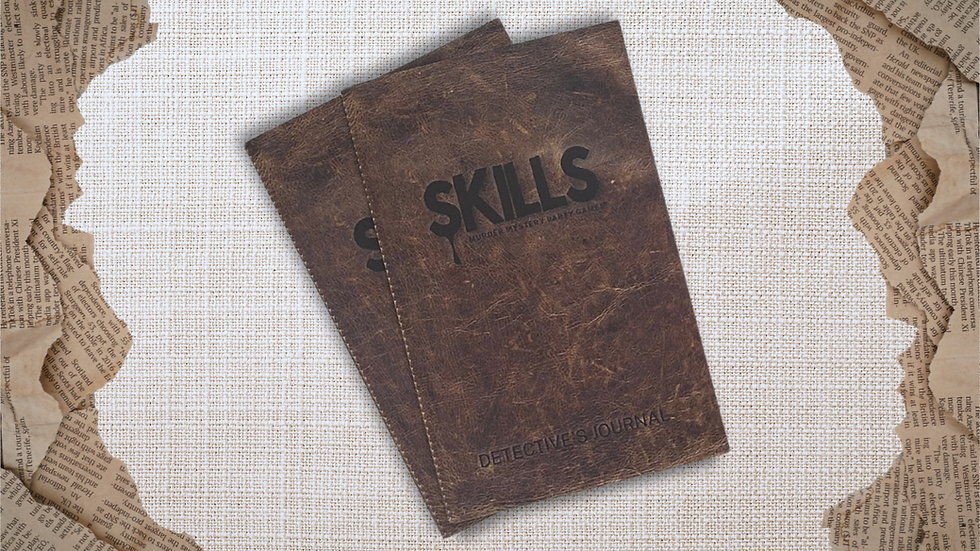Why Guests Need a Detective’s Journal at Your Mystery Party
- Ashley Seybolt

- May 28, 2025
- 3 min read
Updated: Jun 11, 2025

So you’ve decided to throw a murder mystery party. You’ve got the characters, the plot, the costumes, and the themed snacks—maybe even a moody playlist in the background. But here’s one detail that can take your event from memorable to masterful: the Detective’s Journal.
Most hosts focus on the big pieces: script, props, food, and setting. But if you want to run a game that feels organized, immersive, and unforgettable, give every guest their own Detective’s Journal. Here’s why it’s the secret weapon of professional-level mystery hosting.
1. Everyone Gets into Character—Faster
The first few moments of a murder mystery game can be awkward. People are reading character descriptions, trying to remember their accents, and figuring out who’s who. The Detective’s Journal gives them a place to write it all down right away.
The Character Profile page becomes a cheat sheet. Players can note down their character’s name, secrets, and relationships. They can even sketch what they think they look like or jot down a few key personality traits. Suddenly, people are less self-conscious and more confident playing their role.
2. No More Lost Plot Points
Guests get distracted. It’s part of the fun! They’re grabbing snacks, laughing with friends, or taking photos. But if they miss a clue or forget what someone said, it can derail the experience.
With a Detective’s Journal in hand, guests can track everything in real time. Evidence, overheard gossip, shady alibis—it all goes in the notebook. This means better attention to detail, fewer repeat questions, and a much smoother gameplay flow.
3. Keeps Guests Engaged from Start to Finish
A common party pitfall: guests start strong, then lose interest halfway through. But when everyone is scribbling notes, swapping theories, and marking off suspects, they’re locked into the story.
The act of writing things down creates ownership. Your players feel like real detectives, not just partygoers. And when it’s time for the final accusation, they’ve got a full case file to back up their guesses.
4. Helps Shy Guests Shine
Not everyone is a natural performer. Some guests may love the mystery but feel awkward about roleplaying. The Detective’s Journal gives them a low-pressure way to participate.
Instead of speaking up in a group, they can quietly observe, take notes, and build a private theory. Often, these are the players who shock everyone at the end with a perfect deduction, because they were tracking everything all along.
5. Creates a Take-Home Souvenir
Great parties live on in memory, but the Detective’s Journal lets your guests take those memories home. Their scribbles, clues, theories, and in-character jokes become a personal memento of the night.
You can even turn it into a contest: award prizes for the most detailed journal, the funniest notes, or the closest-to-correct deduction. People will hang onto it and talk about your party for weeks afterward.
6. Makes Hosting Easier
From the host’s perspective, the journal is a dream. You’re no longer repeating character motivations or clues for each guest. You can refer them back to their journal. It keeps the evening organized and cuts down on confusion.
Plus, you can customize the journals to match your game: add your logo, theme, or unique characters. Print them, bind them, or offer a digital version, whatever suits your event.
7. Adds a Professional Touch
When guests arrive and receive a Detective’s Journal, it sets a tone. This isn’t a thrown-together party, it’s a production. Your guests know right away that this will be a thoughtful, immersive, well-planned event.
It elevates your mystery from a casual gathering to a full-on experience. Even if you’re hosting at home, the journal adds structure, excitement, and a touch of theatrical flair.
How to Use the Journal at Your Party:
Distribute them at the start with character envelopes or welcome packets.
Encourage note-taking throughout the game.
Include a mid-game clue reveal that requires reviewing their notes.
Use them for a final accusation page where players write their theories.
Collect a few after the game to read out loud or save for your event scrapbook.
At the end of the night, when the mystery is solved and guests are still buzzing about who betrayed whom, their journals will be filled with theories, doodles, red herrings, and ah-ha moments. That’s not just a game, it’s a memory.
And it all started with one simple, powerful tool: the Detective’s Journal.









Comments